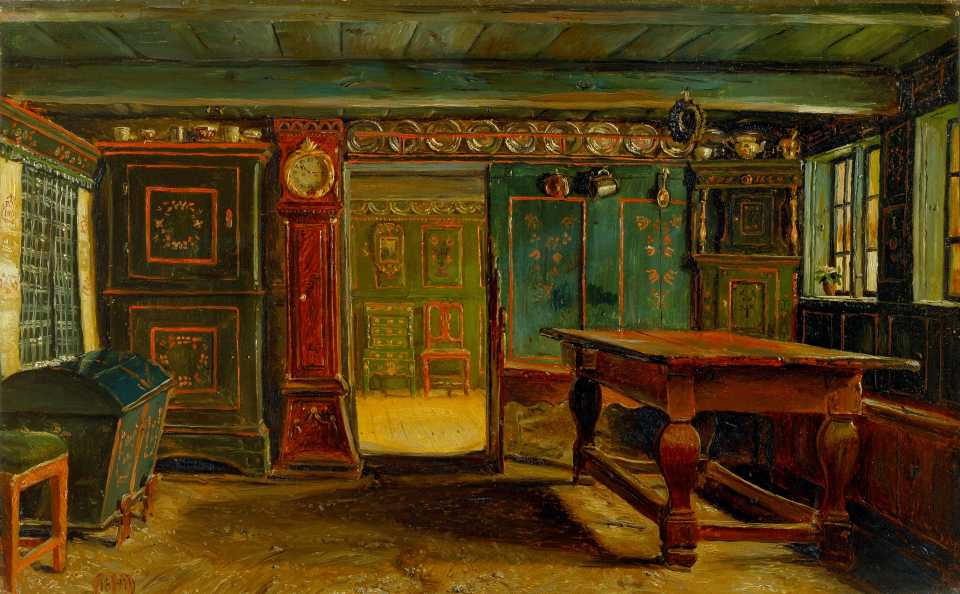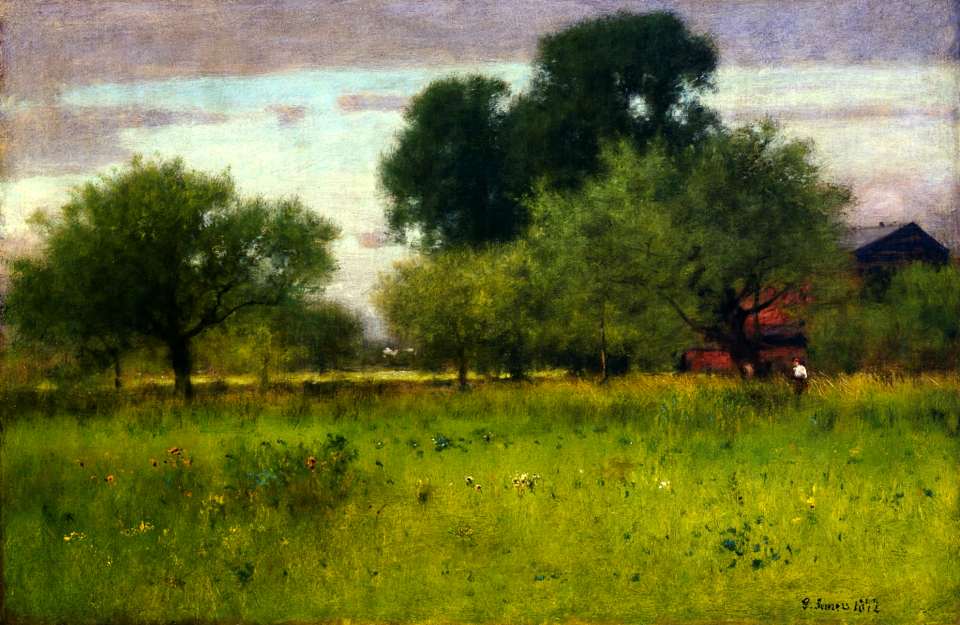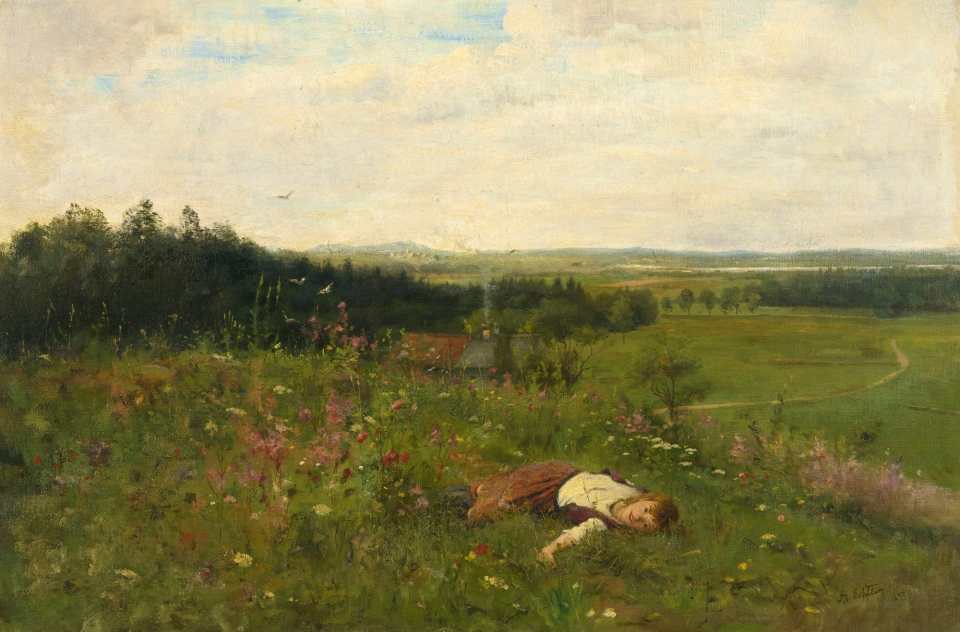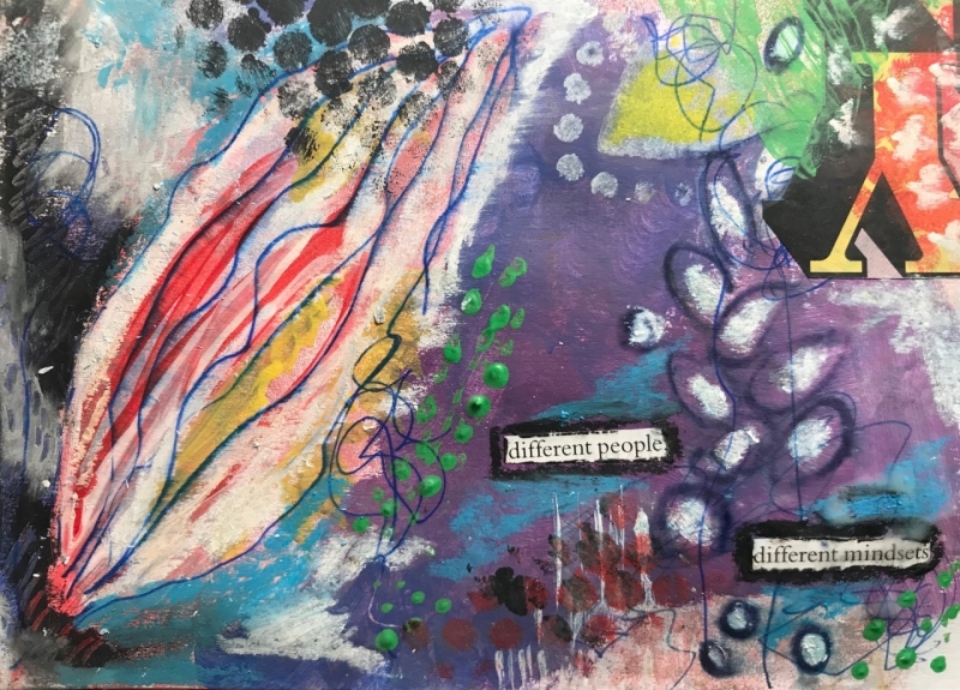Jul 1, 2019

“Farmhouse Room Near Store Heddinge,” oil on canvas, by Christen Dalsgaard, 1847.
by Douglas W. Milliken
For a month or more after our mum percolated a long dramatic breath, sighed it off like a steaming radiator and never took another, my sister and I did something like live in the forever-year-old farmhouse where we had allegedly grown up. Who can say what we thought we were doing there. We certainly weren’t cleaning up the collected mass of a lifetime our mum in her perdurable inquisition had assembled, records labeled in foreign languages and countless volumes on the histories of countries we’d never heard of before or since, folio upon folio of sepia and silver-print photographs showing people who apparently were our progenitors engaged in the rites of self-preservation, a kitchen and pantry chock-a-block with brined mandrake and currant jams and bufo butters dating back to before either one of us was born. Certainly we weren’t corroborating among this orphaned paraphernalia on our obvious common loss. If we were nuns, we’d be the kind committed to a permeating order of silence. But I suspect, then and now, ours was the only sisterhood who’d ever admit us in.
Mum died in the last days of October, leaving—among other things—a lot of fall-time chores incomplete. We filled our days splitting and stacking the remaining cords of maple and birch rounds, banking the foundation with vinyl sheeting and junky bales of hay, digging and stowing beets and gentian in the musty crypt of the cellar. No talking. Nights silent by the woodstove while nightwind rattled the nude trees outside, making haunting nightmusic to which we couldn’t sing along. I wasn’t yet aware that my gap year before college was to be a lifetime appointment. It’d be a few months still before my sister took to grumbling about the dubious promises of a baby-faced Army recruiter. We were holding still, I’m sure, for fear of what might happen if we dared break what was still.
But what is stillness but a denial of all that’s real? Even the steam and shrivel of the dead can’t be slowed to a stop. What ended our attempted stasis of not talking and not really grieving was an owl and a mouse and an elk’s marble eyes. So how’s that for some natural witchery? An early December night like any other but not really night yet—I guess whatever winter preparations that day had us aching and tired early, because there was still some Disney-magic light left outside like a thick beeswax candle hiding the flame its wick-belly contained—and at our rocking-chair nightstations by the woodstove and window we saw first the outlines of basswood and aspen black against the wax-dusk sky, then the demigod mystery of a barred owl descending with a mouse pinched through in its beak, in a talon-flurry trying and failing to perch on the closed window’s sill, then in the instant the bird gave up—vaporizing back into the deepening twilight—the elk’s primordial head appeared. And by this I don’t mean to say that the beast emerged somewhere within the wide lens of the window’s scope: no, the elk’s head, from rack to bell, filled the entirety of the window. As if the bull had sidelong approached the house expressly to peek inside. Which is exactly what he did. Examining us each with one appraising black eye like a shooter no boy wants to lose—taking our measure with the idiot judgment only an animal can levy—then lifting his head and walking on by, the geography of his red hide for a moment defining all the outside world we could see. Because the window was a door the beast saw fit to open, then to shut. When he passed, the candlelight of the sky was gone, the coming threat of dark replaced by true first dark, first stars, first grief.
Then again, ripe as we were for a change, anything, I’m sure, could have stepped forth from the dusky unknown and shocked us into seeing signs. Yet I wonder, does it ever get tiring, being mistaken as a symbol of profound and consistent might? Even now, I can still clearly see it, how the pierced mouse writhed in the owl’s piercing beak, no urgency left in its struggle, its mournful mouth open to cry a cry I’ll never hear.
Our sisterly cloister disbanded soon after. My sister one morning hung up her ax, moved back into her apartment above the gas station on the borderland highway, and that was that. I managed a way of staying alive among the cryptic wreckage of our mum’s life. Eventually, we all went away. But here’s the thing about memory: try to hold on or try to let go, you carry it with you throughout. You leave home and travel to unimagined cities and bedrooms, discover yourself enacting sins and virtues impossible to anticipate, and through it all like a penny in your pocket rides a valedictory light and a preying owl looking for one second’s rest and an elk whose curiosity is too ancient and bold for our mortal hearts to ever comprehend. The death scream of a mouse muted behind glass. Don’t think for a second it’s in the past. We leave nothing behind. We just forget the burden is not light.

Douglas W. Milliken is the author of two novels, To Sleep as Animals and Our Shadows’ Voice (forthcoming 2019), the collection Blue of the World, and several chapbooks, including The Opposite of Prayer. His stories have been honored by the Maine Literary Awards, the Pushcart Prize, and Glimmer Train, as well as published in dozens of journals, including Slice, The Collagist, and The Believer, among others. He lives with three mammals of decreasing size near a post-industrial dam on the Saco River.
Jun 20, 2019

“Apple Orchard,” oil on canvas, by George Inness, 1892.
by Benjamin Cutler
After the final harvest, the forecast
called for freezing temperatures
and the end of this winsome world.
We have never trusted doomsday
news, but this new winter had been born
a living, wet, and hungry thing. We could feel
its ice-watered tongues pushing through
the walls, searching for our mouths. Stand
here, I said, stand here and look. The silvered
sun still knew itself and breathed its yellow
name through the window glass. Wait. Listen,
I said. Doesn’t it sound like our last warm day
of picking? Yes: the apple orchard in fall,
the master’s cider-drunken sleep, our love-
making behind the hives. You loved
the colony’s scent: wax-ripened bread and apple-
blossom gold. The bees’ thrum made you horny,
you said, because it was a music more ancient
than love. Our bodies became themselves then—
all petal-bloom and honey-gleam—each spill
and blood-warm bud a blessing of skin and sun
on our tongues. The memory sung, we stepped
from the window’s dying glow into the stone-
blue shadow—the dark of a winter-dead hive,
the dark of an ice-shattered tree. The tired sun
grew hoarse and the frosted tongues licked
their teeth. When I reached for your hand, I found
a blackened apple frozen to its branch. The forecast
was right after all, I tried to say, but my tongue
was brittle with cold, the words ice in my throat.

Benjamin Cutler’s poetry has appeared or is forthcoming in Cold Mountain Review, Cumberland River Review, The Carolina Quarterly, Barren Magazine, and Longleaf Review, among others. He won the North Carolina Poetry Society (NCPS) Carol Bessent Hayman Poetry of Love Contest, the NCPS Poetry of Witness Contest, and was a finalist for the NCPS Poet Laureate Award. Benjamin is also a husband, a father of four, and an English and creative writing teacher at Swain County High School in the Southern Appalachian Mountains of Western North Carolina where he currently serves as the North Carolina Writers Network-West Swain County representative. His debut collection, The Geese Who Might be Gods, is available from Main Street Rag Publishing.
Jun 4, 2019

“Head of a Boy,” oil on canvas, by Gottlieb Schick, 1802.
by Lauren Lynn Matheny
The boy was holding a balloon. That’s what everyone could agree on—he’d been walking along the edge of the wall, atop the soot-stained balustrade, and he’d been holding a red balloon.
No, a pink balloon, said the man who sold arancini at the cart near the entrance of the park.
There was no doubt it was blue, from the woman who’d been walking her bichon near the fall.
The little girl who’d been swinging on the derelict old swing set (which the town council had been rallying to remove for several years now) said that the adults were all wrong, that the balloon had been the color of raspberries when you mash them into the bottom of your bowl, and that she had gotten a splinter from the swing seat.
Whatever the color, there had been a balloon. There had been a boy. And there had been a fall.
The sky had turned its eight thousand shades of crimson and purple, before it happened. Really, everyone agreed, it was too late for children to be out at the promenade (this, with a judgmental glance at the little girl’s mother, who was rumored to be no better than she should be). The working men had cleared the streets for their dinners; the babies were in bed, dreaming their sunset dreams.
Someone, though, had not understood the meaning of conscionable time. Someone had allowed their son to play out on the city streets, to play atop walls, to slip at the place where the stone grew slick and mossy.
In the absence of any other information, they agreed that the child must be an outsider. Any of their children, should they be atop the balustrade in the first place, would never skip on that particularly traitorous stretch of stone, knowing full well that the sea air hummed up off the rocks below to create a damp and slippery sheen just there, next to the third bench of the promenade. Any of their children would understand the inherent risk of holding to a balloon, one hand incautiously distracted; they would surely never walk without two feet and full focus planted firmly on the narrow beam below them.
The butcher’s wife, who had not seen the fall but who had come by at the sound of commotion, had been heard to cluck distastefully—her husband knew the chief of carabinieri, who’d said that the boy had been dressed in cheap wool shorts and a ratty old cardigan, with a tiny cap on his head. Shorts, in the middle of October; all she could say was that no child of hers would be seen in the middle of winter, half-dressed.
Or, it was to be presumed, walking on top of a balustrade, with no one to watch him, said the florist, who was known to be a particularly spiteful man.
It goes without saying, sniffed the butcher’s wife, before remembering a prior engagement.
The florist’s daughter, as it happened, had been the first to come upon the crumpled little body, broken on the shoals under the promenade’s walls. She’d been boating with her paramour, ignored his horrified protests, and steered them to the boy. When the more sentimental members of the crowd asked if she’d attempted resuscitation, the practical florist’s daughter had replied simply—it was obvious that no efforts in that direction would be needed, since the boy’s skull had been crushed in by the rocks.
She did not relay that she had, in a moment of unusual sensitivity, plucked the little boy’s hat from where it lay perched on a shoal; she imagined it had floated down after him, taking its time to descend, whereas the boy’s body had plummeted in no time flat. The hat was well-mended and sturdy, the sort of thing you’d find in an old antique shop.
The police had inspected the hat for any identifying details, and found none; when they’d turned their backs to address the medical officer, she snatched the hat from the table and shoved it in her purse. It was illogical, of course, but she suddenly could not abide the thought of the lonely little hat sitting, bagged, in a cold evidence drawer.
One young police officer, new to the force, had had the brilliant idea to canvas the balloon sellers in a two-mile radius; the buoyancy of the thing, as reported by spectators, ensured that the balloon could not have traveled far from its origins.
The balloon sellers, to a man, claimed that they had sold no balloons to a child of such description, poor little tyke. October was not a brisk time in the balloon trade. They also found it unlikely that the child would have bought a balloon and inflated it himself; when this tack was suggested, they smirked knowingly at the carabinieri, as though these starched shirts would never have any idea of the mystery and the majesty of their trade.
Only the florist’s daughter was left to think, that night, after the boy’s body had been cut open and investigated, his description posted on flyers and news alerts, his little form locked safely away in a drawer and tucked in to sleep under a paper blanket, at the ugly truth of it all—that the juxtaposition in the sight, the boy’s body tumbling through the air and the flight of the balloon, tinted fire-heart red by the last flicks of the sun, up into the half-shadowed sky, was one of the most beautiful things she’d ever seen.

Lauren Lynn Matheny is a writer of fiction and nonfiction. She received her MFA in fiction writing from Colorado State University in 2018. Her work has won prizes from Third Coast Magazine and Literal Latte.
May 2, 2019

“Young Girl in a Meadow,” oil on canvas, by Adolf Echtler, 1895.
by Partridge Boswell
Blind to what tickles the delta of nerves there
you rub a humming with the back of your hand,
surprised by the soft pulse of a drowsy bee
that somehow hitched a ride on your chambray shirt
when a moment ago you went outside, barefoot
in cool October dew to kiss your love goodbye
through her driver’s side window beside late
rugosas that waited till now to speak, each petal
speckled with a hundred glistening tears of sunlight.
Winter still counties away, larkspur fooled by
recent heat into blooming again, the meadow
rue still tall, its edges only beginning to tinge
like an iconic actor with a full bucket list of roles
to gray into. The garden and hive you tend for another,
thriving these six years (or is it seven now?) since
she left. Easy to lose count with sun’s wheel grinding
memories smooth as it fades needles and leaves.
Easy to see numbers for what they are: cold
and stunningly meaningless as stars. Easy to say
winter would have killed him anyway, as you bend
and lift him from the kitchen floor with a spoon.

Recipient of the Edna St. Vincent Millay and Red Wheelbarrow Poetry Prizes, Partridge Boswell is the author of Some Far Country (Grolier Poetry Prize). His poems have recently surfaced in The Gettysburg Review, Salmagundi, The American Poetry Review, Poetry Ireland Review, and Plume. Co-founder of Bookstock literary festival and the poetry/music group Los Lorcas, he teaches at Burlington Writers Workshop and lives with his family in Vermont.
Apr 5, 2019

“Window Box,” mixed media on paper, by Wendy Russ, 2019. Used with permission.
by Simon Perchik
*
These gravestones left stranded
warped from sunrises and drift
—they need paint, tides, a hull
that goes mouth to mouth
the way seagulls come by
just to nest and preen
though death is not like that
it likes to stand and lean
scattering its brilliant feathers
—look up when you open the can
let it wobble, flow into you
till wave after powerful wave
circles as face to face
and your own loses itself
already beginning to harden.
*
You need more, two sinks
stretching out as constant handfuls
though each arm is lowered
by the darkness you keep at the bottom
—a single cup suddenly harmless
not moving –this rattle you hear
is every child’s first toy
already filled with side to side
that’s not the sound a small stone makes
trying to let go the other, stake out
a cry all its own, fill it
on your forehead without her.
*
You collect grass the way each star
Eats from your hand, trusts you
To become a nest for the afternoons
Not yet at home in the air, named for nights
That circle down, want to be night again
Take root in your chest as the ripples
From the long stone fallen into the water
Teaching it to darken, to stay
Then smell from dirt then shadows
—side by side you dead pull the ground closer
—with both arms need these whispers warm
already the place to ask about you.
*
And though this stone is small
it has more than the usual interest
in the dead, waits among tall grasses
and water holes, smells the way dirt
still warms the afternoons
that no longer have a place to stay
—you leave a nothing in the open
letting it darken to remember
where you buried the Earth
as if the sun could not be trusted
to take back in its light
and by yourself turn away.
*
You read out loud the way this bed
listens for the makeshift seam
loosening each night down the middle
and though there is no sun
you peel off page after page
as if underneath what you hear
are her eyes closing —word by word
louder and louder —you think it’s air
that’s falling —everything in your hands
is too heavy, becomes a shadow, covers her
with a single finger pointed at the ceiling light
what’s no where on the pillow or closer.

Simon Perchik is an attorney whose poems have appeared in Partisan Review, Forge, Poetry, Osiris, The New Yorker, and elsewhere. His most recent collection is The Osiris Poems, published by boxofchalk in 2017. For more information including free e-books and his essay “Magic, Illusion and Other Realities” please visit his website at simonperchik.com. To view one of his interviews please visit this YouTube video.








